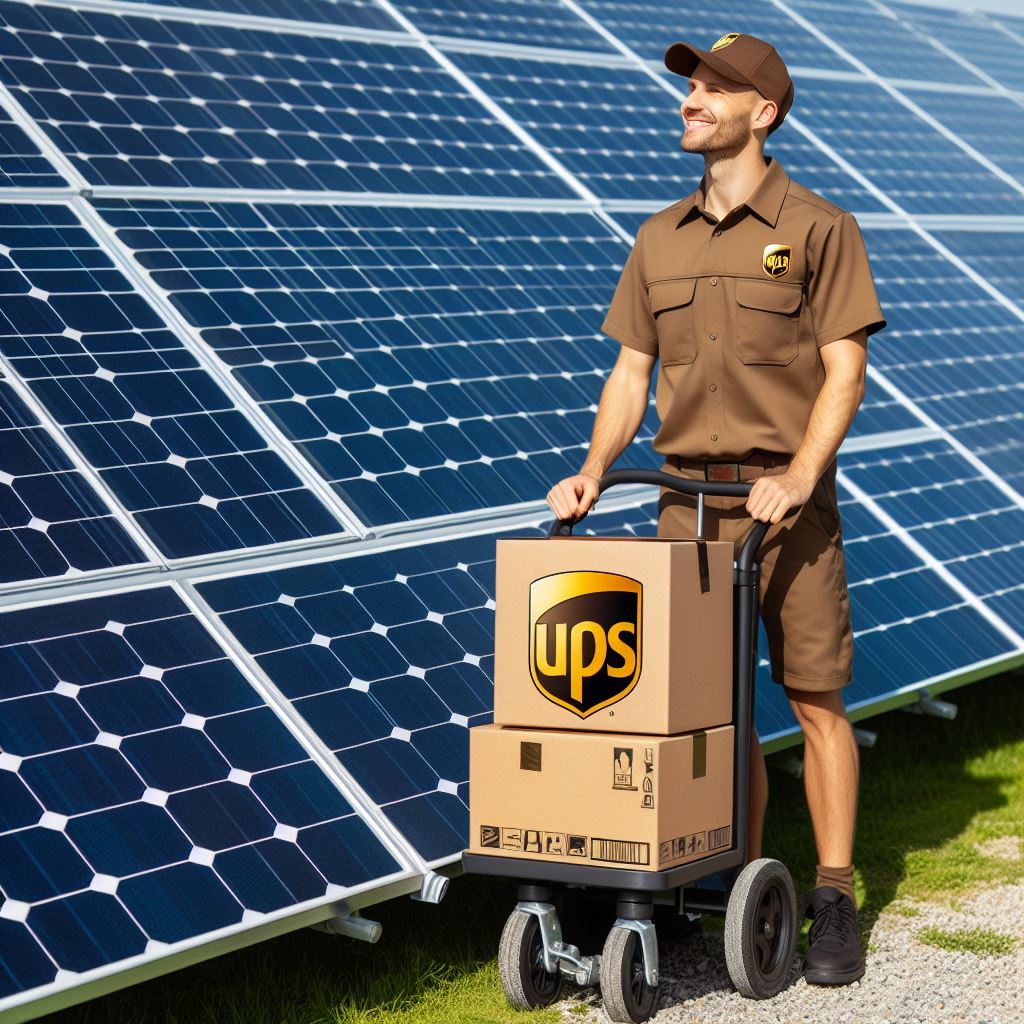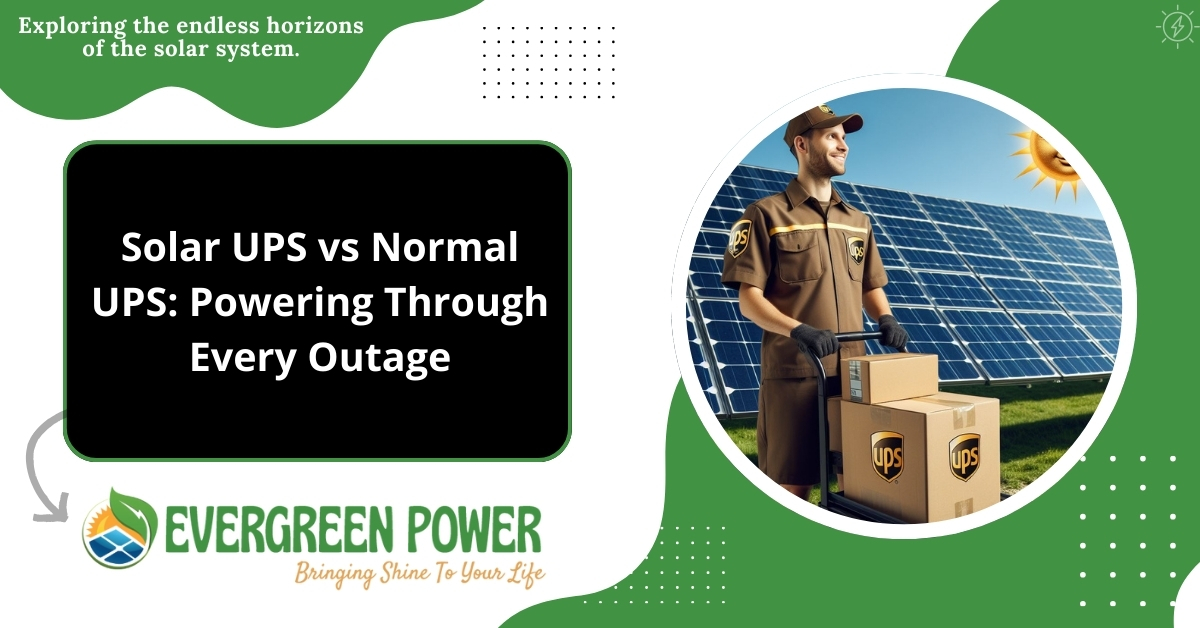Unsure if a Solar UPS vs Normal UPS is right for you? Dive deep into their functionalities, discover key differences, and find the perfect fit for your backup power needs.
Choosing the right Uninterruptible Power Supply (UPS) can be crucial for protecting your sensitive electronics during power outages. But with the rise of solar energy, a new option emerges – the solar UPS. Let’s explore the key differences between these two systems to help you make an informed decision.
- Imagine being puzzled by the difference between a UPS and an inverter. If that sounds like you, then keep reading. By the time you finish this article, you’ll be crystal clear on these terms and won’t mix them up again.
- Both UPS and inverters come into play when the power suddenly cuts out. But are they the same? And which is the superior choice for homes or businesses? Let’s delve into it.
What is a Normal UPS?
Providing a lifeline to crucial electronic devices like computers, uninterruptible power supplies (UPS) protect against the unpredictable nature of power outages. UPSs automatically step in when the primary power source fails, using stored energy reserves to maintain operation. Downtime can have significant financial or operational consequences, so uninterrupted power flow is invaluable.
With the UPS, the computer is connected to the power source via a sophisticated yet straightforward principle. The UPS continuously monitors incoming power supplies, ready to intervene when disruptions occur. A proactive approach minimizes the impact of unexpected power failures by completing critical tasks and saving valuable data.
Its versatility makes UPS technology so intriguing, with a variety of UPS systems available to meet individual needs. Our standby UPS systems offer basic power protection, while our online double-conversion UPS systems provide the most advanced power protection. To select the best UPS based on factors such as power capacity, runtime, and scalability, it is important to understand the nuances of each UPS type. We will explore the intricacies and best practices of UPS systems as we delve deeper into the world of UPS technology.

Components of a Normal UPS:
- Rectifier: Converts incoming AC power from the grid to DC power for battery charging.
- Battery: Stores DC power to be used during outages.
- Inverter: Converts stored DC battery power back to AC power for powering your devices.
Applications of Normal UPS:
- Homes with sensitive electronics like computers, home entertainment systems, and medical equipment.
- Businesses that rely on uninterrupted data processing and communication.
- Industrial settings where power fluctuations can damage equipment.
What is a Solar UPS (Solar Hybrid System)?
A solar UPS, often referred to as a solar hybrid system, combines the functionality of a traditional UPS with the power of solar energy. It integrates solar panels, a solar charge controller, a battery bank, and an inverter into a single system.
Components of a Solar UPS:
- Solar Panels: Generate DC electricity from sunlight.
- Solar Charge Controller: Regulates the charging current from solar panels to optimize battery life.
- Battery Bank: Stores solar-generated electricity for backup power during outages and grid failures.
- Inverter: Converts stored DC battery power (or grid power if available) to AC power for powering your devices.
Applications of Solar UPS:
- Homes and businesses seeking energy independence and reduced reliance on the grid.
- Areas experiencing frequent power outages.
- Eco-conscious individuals and organizations aiming for a sustainable power solution.
Key Differences Between Solar UPS and Normal UPS
Here’s a breakdown of the key differences between these two UPS systems:
| Feature | Normal UPS | Solar UPS |
| Power Source | Utility Grid | Solar Panels (Primary) / Utility Grid (Backup) |
| Cost upfront | Generally lower | Generally higher due to solar panel installation |
| Running Cost | Depends on utility grid rates | Potentially lower with reduced reliance on the grid |
| Energy Independence | No | Yes (to a certain extent, sunlight dependent) |
| Sustainability | Lower | Higher due to the use of renewable solar energy |
| Maintenance | Regular battery replacement | Regular battery replacement, solar panel maintenance |
How Solar Inverters Harness & Convert the Sun’s Energy:
Solar inverters are the backbone of any solar power system, converting the sun’s radiant energy into usable electricity. Unlike traditional inverters, which rely solely on grid power, solar inverters tap into the abundant energy provided by sunlight. This fundamental difference sets them apart in both function and energy source. Understanding the inner workings of solar inverters, including the role of blocking diodes and charge controllers, is essential for making informed decisions about energy usage and sustainability goals.
Operational Functions Diodes and Charge Controllers in Inverters:
Blocking diodes and charge controllers are indispensable components of solar inverters, ensuring efficient energy conversion and system safety. Blocking diodes facilitates the one-way flow of energy from solar panels to batteries, preventing energy loss during periods of low sunlight or at night. Charge controllers regulate the charging process of solar batteries, optimizing performance and extending their lifespan. Together, these components work silently behind the scenes, maximizing the utilization of solar energy and maintaining the integrity of the system.
| Solar Hybrid Inverter / PCU (L-KVA) Available Variants |
| 700 VA / 12 VDC |
| 900 VA / 12 VDC |
| 1100 VA / 12V |
| 1600 VA / 24 VDC |
| 2100 VA / 24 VDC |
| Solar Hybrid Inverter / PCU (MPPT Type) Available Variants |
| 1450 VA / 24 VDC |
| 2100 VA / 24 VDC |
| 3.5 KVA / 48 VDC |
| 5 KVA / 48 VDC & 96 VDC |
| 7.5KVA / 120 VDC |
| 10 KVA / 192 VDC |
Benefits of Using a Solar Inverter for Energy Efficiency:
Solar inverters offer a multitude of benefits, making them an attractive choice for those seeking energy efficiency and sustainability. By harnessing the sun’s free and abundant energy, solar inverters significantly reduce electricity bills and reliance on the grid. Moreover, their use contributes to a reduced carbon footprint, aligning with efforts to combat climate change and build a greener future. Additionally, solar inverters provide energy independence, ensuring uninterrupted power supply even during grid outages, while new models boast enhanced efficiency, minimizing energy wastage.

Advantages of Using a Normal Inverter for Reliability:
While solar inverters excel in harnessing renewable energy, traditional inverters offer unparalleled reliability and ease of use. During power outages, normal inverters ensure continuity by supplying electricity to essential appliances, providing peace of mind to homeowners. Their straightforward setup and maintenance make them an ideal choice for those prioritizing simplicity without compromising performance. Additionally, normal inverters undergo rigorous testing to guarantee optimal performance, safety, and durability, making them a trusted choice for various applications and environments.
Choosing an Inverter- Key Factors to Consider:
Selecting the right inverter requires careful consideration of several key factors. Understanding your energy needs and system compatibility is essential for determining the most suitable option. Comparing costs, including initial setup expenses and long-term savings, helps weigh the financial implications of choosing solar versus traditional inverters. Additionally, assessing available space ensures proper installation and optimal performance of the chosen inverter, whether it be a solar or normal variant.
Evaluating Efficiency in Solar Inverters:
Efficiency is a critical aspect of solar inverters, impacting their ability to convert solar energy into usable power effectively. Peak efficiency and weighted efficiency are two essential metrics used to evaluate performance under varying conditions. While peak efficiency represents the maximum output achievable in ideal circumstances, weighted efficiency accounts for real-world factors such as temperature fluctuations and environmental conditions. By analyzing these efficiency ratings, consumers can make informed decisions and select solar inverters that offer optimal performance and reliability.
Solar UPS vs. Normal UPS: Weighing the Pros and Cons
When it comes to protecting your electronics during power outages, both solar and normal UPS systems have their merits. But which one is right for you? Let’s break down the pros and cons of each to help you make an informed decision.
Normal UPS: Reliable Backup, Familiar Choice
Pros:
- Lower upfront cost: Normal UPS systems are generally more affordable than their solar counterparts.
- Simple installation: Just plug it in and you’re ready to go. No need for complex solar panel installation.
- Reliable backup power: Provides consistent backup power during outages as long as the batteries are maintained.
Cons:
- Reliant on the grid: During extended outages, you’re dependent on the grid coming back online.
- Ongoing electricity costs: You’ll continue to pay for the electricity used to charge the UPS batteries.
- Limited environmental benefits: Relies on fossil fuel-generated grid power.
Solar UPS: Sustainable Power, Long-Term Savings
Pros:
- Energy independence: Provides backup power even during extended outages, thanks to solar energy.
- Reduced electricity costs: Over time, solar energy generation can significantly lower your reliance on the grid.
- Environmentally friendly: Utilizes renewable solar energy, reducing your carbon footprint.
Cons:
- Higher upfront cost: The initial investment for solar panels and installation is significantly higher.
- Maintenance considerations: Requires regular battery replacement and solar panel maintenance.
- Sunlight-dependent: Solar energy production relies on sunlight availability. Backup power during extended periods without sun may be limited.
The Modern Trend: Why Solar UPS Systems are Gaining Traction
While both solar and normal UPS systems offer valuable backup power, the tides are shifting towards a more sustainable future. Here’s why solar UPS systems are becoming increasingly popular:
Rising Energy Costs: The cost of grid-supplied electricity is steadily rising. Solar UPS systems offer a path towards energy independence, allowing you to generate your own power and potentially reduce reliance on the grid, leading to long-term cost savings.
Environmental Concerns: Climate change and concerns over fossil fuel dependence are driving a shift toward renewable energy sources. Solar UPS systems utilize the power of the sun, a clean and inexhaustible resource, to minimize your environmental impact.
Government Incentives: Many governments offer attractive incentives like tax credits and rebates to encourage the adoption of solar power. These incentives can significantly reduce the upfront cost of a solar UPS system, making it a more financially viable option.
Technological Advancements: Solar panel technology has become more efficient and affordable in recent years. Additionally, advancements in battery storage capacity allow for better management of solar-generated electricity. These advancements make solar UPS systems a more reliable and attractive choice.
Increased Awareness: Consumers are becoming increasingly aware of the benefits of solar energy. With growing awareness comes a demand for sustainable solutions like solar UPS systems, which cater to environmentally conscious individuals and businesses.
However, it’s important to consider your specific needs:
- Upfront Cost: Solar UPS systems require a higher initial investment compared to normal UPS.
- Sunlight Availability: Solar energy production relies on sunlight. If you live in an area with limited sunshine, a normal UPS may be a better option.
Overall, the trend is clear. Solar UPS systems offer a compelling combination of energy independence, environmental benefits, and potential cost savings in the long run. While the upfront cost might be higher, government incentives and technological advancements are making them a more accessible and attractive option for the modern consumer.

FAQs about Solar UPS vs Normal UPS
Which UPS is more reliable?
Both systems offer reliable backup power. However, a solar UPS provides an additional layer of security with solar energy as a primary source.
Is a solar UPS right for me?
If you experience frequent outages, prioritize energy independence, and have suitable space for solar panels, a solar UPS is a great option.
How much does a solar UPS cost?
The upfront cost is higher due to solar panel installation. However, long-term savings on electricity bills can offset the initial investment.
Can I install a solar UPS myself?
Solar panel installation requires expertise. Consult a qualified solar installer for a professional setup.
How much maintenance does a solar UPS require?
Both systems require regular battery replacement. Solar UPS adds solar panel maintenance to the mix.
Is a solar UPS environmentally friendly?
Absolutely! By utilizing solar energy, a solar UPS reduces reliance on fossil fuels and your carbon footprint.
Conclusion
Whether you prioritize immediate affordability or a sustainable, long-term solution, both normal and solar UPS systems offer valuable protection for your electronics. For those seeking to take control of their power source and embrace clean energy, a solar UPS empowers you to weather outages while making a positive impact on the environment. So, make an informed choice, and let your next power outage be a chance to experience the peace of mind that comes with uninterrupted power, however you choose to generate it.
Visit our Site:
Welcome to EG Power Ltd – your go-to destination for solar solutions. With over five years of experience in solar and renewable energy, we’re dedicated to providing the most cost-effective panels on the market.
We prioritize environmental sensitivity and offer personalized solutions to meet your needs. Join us in saving the planet – contact us today!
Phone: 0300 1819060
Email: info@egpowerltd.com

